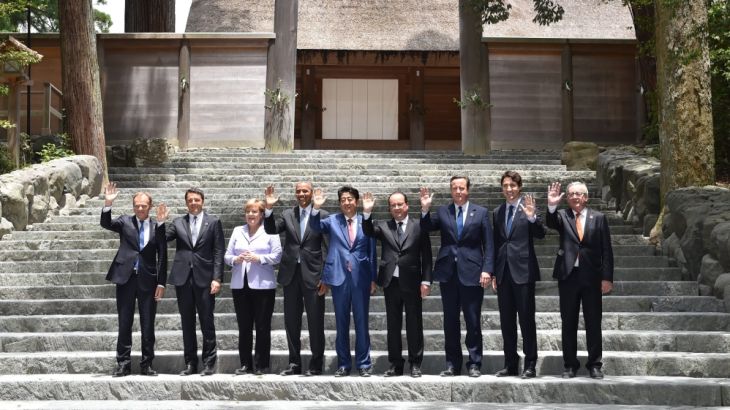Economy and security to dominate G7 summit in Japan
Leaders of industrial nations meet in Japan to discuss economy, security and tensions in East and South China Seas.

Leaders of seven leading industrialised countries have converged on Ise-Shima in Japan for a two-day summit expected to focus on the global economy and international security.
Other summit topics include terrorism, cybersecurity and maritime security, including China’s assertiveness in the East and South China Seas, where the country has territorial disputes with Japan and several Southeast Asian nations.
Keep reading
list of 4 items‘Triple spending’: Zimbabweans bear cost of changing to new ZiG currency
Boeing hit with 32 whistleblower claims, as dead worker’s case reviewed
US imposes new sanctions on Iran after attack on Israel
Donald Tusk, the European Union president, said on Thursday that he would seek G7 support for more global aid for refugees.
WATCH: Counting the Cost – The global steel industry downturn
“If we [G7] do not take the lead in managing this crisis, nobody will,” he said.
A flow of people from Syria and elsewhere to Europe has confronted the continent with its biggest refugee crisis since World War II.
Leaders will refer to maritime security in statements issued after the summit ends on Friday, including a call for respect for the rule of law and opposition to provocative acts that try to change the status quo by force, Japanese media said.
Fiscal stimulus debate
Although full agreement on macro-economic policy looks hard to come by, the G7 leaders are expected to promote monetary, fiscal and structural policies to spur growth in their communique when the summit ends.
With Britain and Germany resisting calls for fiscal stimulus, Shinzo Abe, Japan’s prime minister, will urge the G7 leaders to adopt a flexible fiscal policy, taking into account each country’s own situation.
Some analysts say Abe hopes to use a G7 statement on the global economy as cover for a domestic fiscal package including the possible delay in a rise of the nation’s sales tax to 10 percent from 8 percent planned for next April.
|
|
The G7 leaders are also expected to reaffirm their previous commitment to stability in the foreign exchange market.
The G7 groups are Britain, Canada, France, Germany, Italy, Japan and the United States.
In advance of Thursday’s meeting, Abe took G7 leaders to the Ise Grand Shrine, the most sacred site in Shinto, Japan’s indigenous religion.
Ise Grand Shrine has 2,000 years of history and holds rituals and ceremonies to pray for world peace, a rich harvest and the prosperity of Japan’s imperial family.
Abe has said that he hopes the shrine visit will provide an insight into the heart of Japanese culture. Critics say he is catering to a conservative base that wants to put religion back in politics and revive traditional values.
|
|